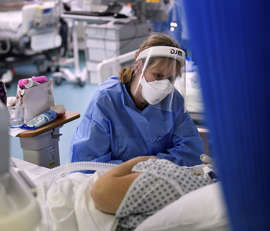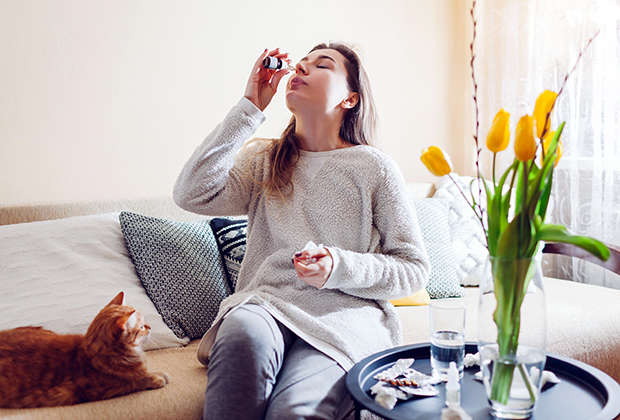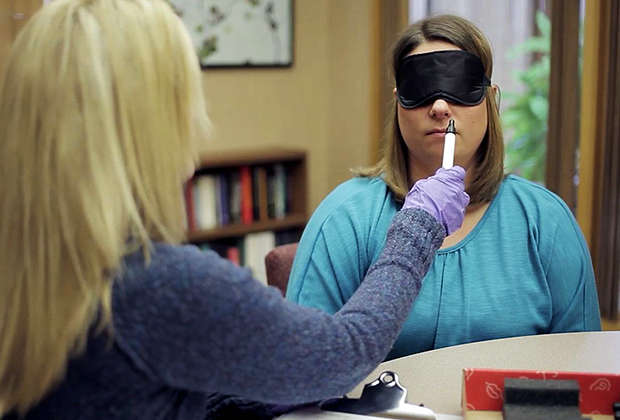
UK to conduct research on vitamin A's effectiveness in recovering sense of smell after COVID-19
Researchers at the University of East Anglia and James Paget University Hospital said clinical trials of Apollo will begin in December. Their goal is to find out whether vitamin A will help restore the sense of smell damaged by coronavirus infection. The trials have already received financial support from the National Institute for Health Research.
For 12 weeks, 38 volunteers who lost their sense of smell will drip drops with vitamin A into their nose, 19 people from the control group – an inactive substitute, peanut butter. After that, they will be given to smell distinctly distinguishable odors – roses and rotten eggs, and at this time they will have a nuclear magnetic resonance imaging of the brain. The researchers plan to compare brain scans of both groups. “We will be tracking changes in the size of the olfactory bulb – the area above the nose where olfactory receptors combine and connect to the brain. We will also look at the brain activity associated with smell recognition, ”says one of the researchers, professor at the University of East Anglia School of Medicine Carl Philpott.
According to him, the researchers want to find out whether the size and activity of signaling pathways in the brain of patients increases when taking nasal drops with vitamin A. “This would indicate the restoration of damage caused to the nose by viral infections, including COVID-19,” says Philpott …

Photo: Mariia Boiko / Legion-media Loss of smell is a common symptom of COVID-19, like many other viral infections
Loss of smell is one of the most common and easily distinguishable symptoms of coronavirus infection. Estimates of its prevalence range from 43 percent to nearly 86 percent among researchers. At the same time, one study suggests that most develop anosmia – a complete loss of smell. Hyposmia – a decrease in the sense of smell – was observed in 20 percent of patients. Even less often, phanthosmia develops – olfactory hallucinations and parosmia – a distorted perception of odors.
How exactly the coronavirus infection causes the loss of smell remains unclear. Scientists speculate that it can cause damage to the olfactory nerve and the olfactory bulb. But they do not have the ACE2 receptor, which SARS-CoV-2 usually uses to enter the cell. In addition, COVID-19 is known to attack the supporting cells of the olfactory epithelium, which play a key role in the functioning of the olfactory neurons.
Loss of smell is common not only for COVID-19, but also for other viral infections. It is, according to some estimates, observed in five percent of the world's population. In ten percent of them, it was caused by viral infections. Loss of smell leads to loss of appetite, taste disturbances, depression, anxiety disorders.
The majority of those who have recovered from the coronavirus infection recover their sense of smell, but there are those who do not. According to the Global Chemosensoric Research Consortium, more than 50 percent of patients retained a sense of smell impairment 40 days after the onset of infection.
The effect of drops with vitamin A on loss of smell has already been proven.
A similar clinical study by British researchers was prompted by the results of a recent work carried out in 2017 by scientists from the Dresden University of Technology. Their study involved 170 patients with a disorder of smell after viral infections. 46 of them were treated in the traditional way – the so-called training of the sense of smell, when for several weeks the patient regularly – six to eight times a day – inhales for 12 weeks a set of essential oils – rose, eucalyptus, lemon and clove.
In relation to 124, a combination therapy was used from training the sense of smell and intranasal drops with vitamin A. Its metabolite, retinoic acid, is a regulator of transcription and plays an important role in the development and repair of tissues. Signaling pathways associated with it are involved in the formation of the olfactory system in the embryo and in the restoration of olfactory neurons in adults. These patients had significantly better performance in subsequent odor recognition tests. Sense of smell improved in 37 percent of these patients, compared with 23 percent in the group who only trained their sense of smell. However, the scientists noted that their study was retrospective, and in order to confirm the efficacy of vitamin A, it is necessary to conduct placebo-controlled experiments.

Photo: St. Croix Sensory, Inc. A is not the only vitamin planned to be used in the fight against COVID-19
Researchers are equally seriously interested in the therapeutic potential of vitamin D. It turned out that its deficiency can cause a more severe course of coronavirus infection. However, the risk factors for severe COVID-19 are the same as for vitamin D deficiency: general ill health, poor nutrition, diabetes, liver and kidney disease, so it is premature to say that vitamin D deficiency is a separate risk factor. At the same time, experts from the Cochrane Collaboration, an international non-profit organization that participates in the development of WHO guidelines, note that the vitamin helps in regulating blood sugar levels and strengthening the human immune system, so its intake will not hurt.
At the same time, there is not enough evidence of the effectiveness of vitamin D as a remedy against coronavirus. Its clinical trials in Brazil, the Cochrane Review notes, are not convincing enough, because during them different dosages were given at different times, the level of the vitamin in the body was not measured accurately enough. Data on whether taking vitamin D prevented death from COVID-19 is also conflicting. However, in the course of clinical trials, there were no contraindications to the use of the vitamin.
At the same time, numerous studies on vitamin D are still ongoing. Many works, often contradictory, are published regarding its effect on health and its active forms. For example, a study by Canadian scientists based on genetic data shows that the vitamin is useless for the prevention of COVID-19, while American researchers found that vitamin D blocks the proteins involved in the replication of SARS-CoV-2.

